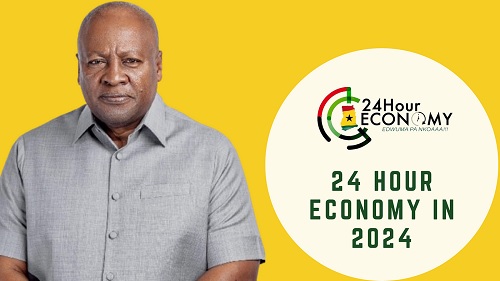
The mirage of 24-hour economy: A closer look at NDC’s economic proposal
The National Democratic Congress (NDC) has proposed a 24-hour economy as a means to stimulate Ghana's economic growth when they return to power.
Advertisement
However, the NDC has not been able to bring clarity and convince the electorate about this policy.
A cohesive blueprint for its implementation has also not been communicated clearly, leading to various interpretations and explanations by its key communicators.
This inconsistency raises concerns about the party's understanding and preparedness to execute such a policy.
The concept of a 24-hour economy, while appealing, requires careful consideration of its implications on Ghana's economic environment. Key questions arise:
Is the public sector demand sufficient to justify night operations?
Can every region in Ghana sustain activity at night due to the high demand for services?
The success of a 24-hour economy is often limited to metropolitan and highly urbanised areas in advanced countries, where demand for goods and services is consistently high.
Furthermore, the NDC's approach to this policy appears to be contradictory.
On the one hand, former President Mahama suggests reducing electricity tariffs for businesses to operate at night.
On the other hand, he proposes shifting public sector operations to include night shifts.
Additionally, there is talk of stimulating the economy to increase demand, which would support a 24-hour business environment.
These varying statements lead to confusion about the party's actual strategy.
The feasibility of implementing a 24-hour economy also intersects with Ghana's current economic challenges.
With the NDC criticising the incumbent government's handling of the economy, it is unclear how the party plans to transition from the current state to a robust 24-hour economy when power is handed over to them in 2025.
The timeline for such a transformation and its impact on the existing economic framework are matters of concern.
Moreover, the practicality of a 24-hour economy in Ghana is questionable given the country's labour laws, which do not support hourly remuneration.
The promise of a 24-hour economy by the NDC therefore should be critically examined to assess its realism and potential impact on the nation's economic development.
Isaac Ofori
Human Rights Advocate
PhD Student (UEW, SCMS)




